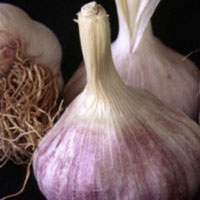Penn Herb Wellness Guide
GarlicFind Products
 © Steven Foster
© Steven FosterHow It Works
The sulfur compound allicin, produced by crushing or chewing fresh garlic or by taking powdered garlic products with allicin potential, in turn produces other sulfur compounds: ajoene, allyl sulfides, and vinyldithiins.1 Aged garlic products lack allicin, but may have activity due to the presence of S-allylcysteine.
Many publications have shown that garlic supports the cardiovascular system. While earlier trials suggest it may mildly lower cholesterol and triglyceride levels in the blood,2, 3, 4 more recent trials found garlic to have minimal success in lowering cholesterol and triglycerides.5, 6, 7 Garlic also inhibits platelet stickiness (aggregation) and increases fibrinolysis,8 which results in a slowing of blood coagulation. It is mildly antihypertensive9 and has antioxidant activity.10
Garlic’s cardiovascular protective effects were illustrated in a four-year clinical trial on people 5080 years old with atherosclerosis.11 It was found that consumption of 900 mg of a standardized garlic supplement reduced arterial plaque formation by 518%. The benefits were most notable in women.
In test tube studies garlic has been found to have antibacterial, antiviral, and antifungal activity.12 However, these actions are less clear in humans and do not suggest that garlic is a substitute for antibiotics or antifungal medications.
Human population studies suggest that eating garlic regularly reduces the risk of esophageal, stomach, and colon cancer.13, 14 This may be partly due to garlic’s ability to reduce the formation of carcinogenic compounds.
How to Use It
People who wish to consume garlic and have no aversion to its odor can chew from one to two whole cloves of raw garlic daily. For those who prefer it with less odor, enteric-coated tablets or capsules with approximately 1.3% allin are available. Clinical trials have used 600900 mg (delivering approximately 5,0006,000 mcg of allicin potential) per day in two or three divided amounts.15, 16 Aged-garlic extracts have been studied in amounts ranging from 2.47.2 grams per day.
Copyright 2025 TraceGains, Inc. All rights reserved.
Learn more about TraceGains, the company.
The information presented by TraceGains is for informational purposes only. It is based on scientific studies (human, animal, or in vitro), clinical experience, or traditional usage as cited in each article. The results reported may not necessarily occur in all individuals. Self-treatment is not recommended for life-threatening conditions that require medical treatment under a doctor's care. For many of the conditions discussed, treatment with prescription or over the counter medication is also available. Consult your doctor, practitioner, and/or pharmacist for any health problem and before using any supplements or before making any changes in prescribed medications. Information expires December 2025.


